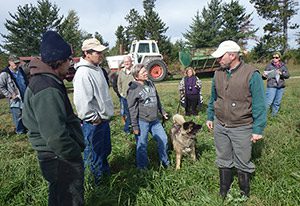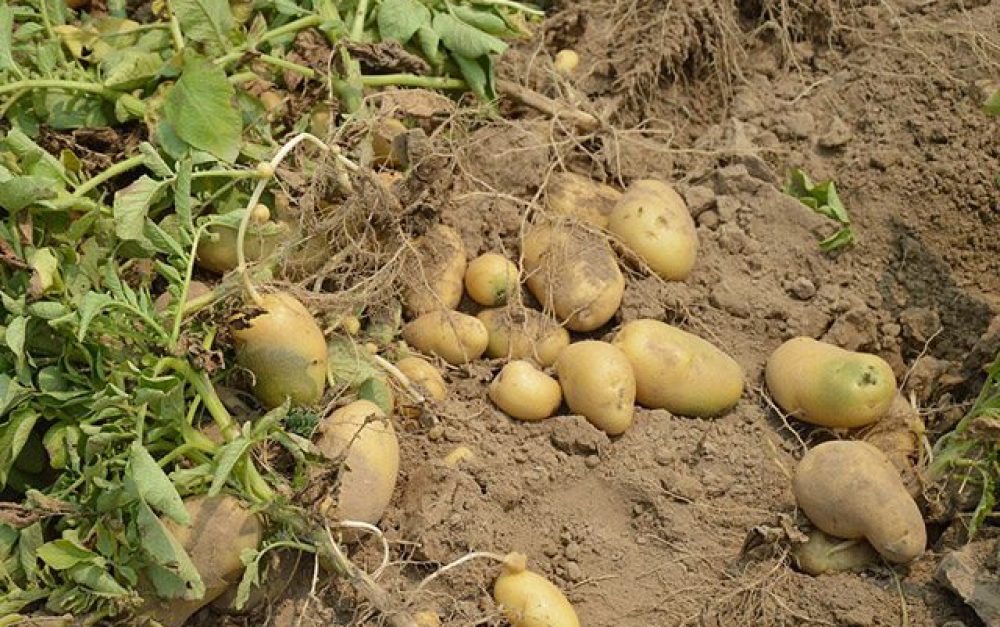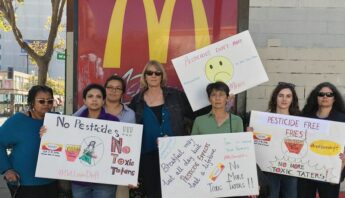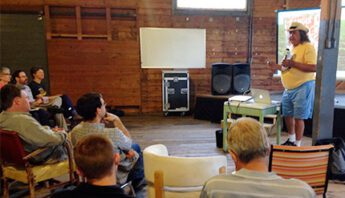Last Saturday morning, I started my day ushering traffic down a dirt road into a potato field. The Toxic Taters Coalition was hosting a field day at Larry Heitkamp’s Yellow Rose Organic Farm outside of Sebeka, MN.
Last Saturday morning, I started my day ushering traffic down a dirt road into a potato field. The Toxic Taters Coalition was hosting a field day at Larry Heitkamp’s Yellow Rose Organic Farm outside of Sebeka, MN. About twenty people gathered from surrounding counties to educate themselves about organic potato production, connect with local farmers and learn more about Toxic Taters.
Why tour an organic potato farm? Although a single, massive company — RD Offutt Company, or RDO — plants tens of thousands of acres of potatoes each year in north central Minnesota, it’s certainly not the only potato producer in the region. Local residents who live near RDO potato fields launched the Toxic Taters campaign because they know that RDO’s model of potato production isn’t the only way. Our Coalition wanted to learn more about sustainable potato production — and who better to learn from than a local farmer who is hard at work implementing organic, ecosystem-based practices on his farm?
Larry Heitkamp moved his farming operation from North Dakota to Minnesota in 2011, and has been hard at work since then to build the soil and move towards a no-till organic system in Wadena County. We were lucky enough to also be joined by Kent Solberg of the Sustainable Farming Association — Larry’s neighbor, and an expert in developing sophisticated cover cropping systems in partnership with Minnesota farmers.
If you start with healthy soil…
 After our group circled up for a quick round of introductions, Kent led us all into a green sea of cover crops: knee-high grasses and broadleaf plants that covered our boots in dew.
After our group circled up for a quick round of introductions, Kent led us all into a green sea of cover crops: knee-high grasses and broadleaf plants that covered our boots in dew.
Once in the field, he reached down and plucked a handful of kale leaves, rye and crimson clover — three of the eight crops in the tailored mix that Larry and Kent have developed for Yellow Rose Farm. Creating the right cover crop mix, like most agricultural practices that work to complement on-farm ecosystems, requires close observation of what’s happening in the field. The mix of crops planted at Yellow Rose will help build organic matter in the sandy soil that’s characteristic of this growing region. And next year, this field will be planted in potatoes, which will reap the benefits of cover crops growing here now.
If there was one key lesson from Saturday’s field day, it was that soil health is the name of the game in sustainable farming systems. Contrast this soil-centered ethos with fumigation, a standard practice in conventional potato production that sterilizes the field by injecting gaseous pesticides into the soil; while fumigants kill off soil pests, they also kill everything else, including beneficial organisms that play critical roles in soil ecosystems.
Thriving fields
Once our group had finished combing through cover crops, we crossed into the next field, which was covered in neat rows of potatoes ready for harvest. Yellow Rose sells five varieties of potatoes, and Larry pointed out a plot that had been set aside for testing more than 20 additional organic varieties. He walked us through some of his practices for weed, insect and disease management. And he explained a wide array of tools he uses for early season weed control, his choices of diverse potato varieties to protect against disease, a few organic pesticides he uses sparingly at key moments, and his scouting practices to keep a close eye on the field.
Larry and Kent didn’t share any magic tricks or trade secrets for growing the perfect organic potato. Instead, they shared measured advice that reflected some of the key principles of agroecology: diversity breeds resilience, knowledge of the on-farm ecosystem is a farmer’s greatest asset, and the benefits of healthy soil outstrip the contributions of many chemical inputs.
A better way
Since the launch of the Toxic Taters campaign, we’ve known that potatoes can be grown with fewer pesticides. RDO knows it too: the company grows organic potatoes in other states.
But our campaign isn’t about eliminating a single problematic pesticide. While RDO has been making public claims about reducing pesticide use, the company still hasn’t met the key demands of Toxic Taters. We’re calling on RDO to increase transparency by sharing information on all pesticide applications with the public, and to work with sustainable agriculture experts and third party certifiers to make ongoing improvements to their agricultural practices.
Keeping the pressure on
Our farm tour is done, but we’re not hunkering down for the winter just yet. Although we delivered 20,000 petition signatures to McDonald’s — a large-scale RDO customer — at the corporation's shareholder meeting in May, the company has been remarkably quiet about its potato supply chain. McDonald’s hasn’t publicly addressed our concerns, and they haven’t been communicating with Toxic Taters directly, either.
To make sure that McDonald’s knows that Toxic Taters isn’t going anywhere, we're planning a day of action on October 28 by taking our campaign directly to McDonald’s. We’ll visit local Minnesota McDonald’s stores and deliver our message to individual franchises and local communities across the state. Toxic Taters supporters nationwide can join in by calling McDonald’s customer comment line to ask about the potatoes that McDonald’s sources. Stay tuned for more details! As a primary RDO customer, McDonald's has the power to demand different growing practices for the potatoes it purchases — growing practices that protect local communities from being exposed to harmful pesticides sprayed in the fields.
Take action » Hazardous pesticides applied to McDonald's potatoes are known to cause chronic health problems, have damaged nearby crops and livestock, and can disrupt local ecosystems. Join us in urging McDonald's to do the right thing and insist their potatoes, grown by RDO, are produced by sustainable practices.








